- Home
- Lewis Carroll
Through the Looking Glass Page 8
Through the Looking Glass Read online
Page 8
“None to speak of,” the Knight said, as if he didn't mind breaking two or three of them. “The great art of riding, as I was saying, is—to keep your balance properly. Like this, you know—”
He let go the bridle, and stretched out both his arms to show Alice what he meant, and this time he fell flat on his back, right under the horse's feet.
“Plenty of practice!” he went on repeating, all the time that Alice was getting him on his feet again. “Plenty of practice!”
“It's too ridiculous!” cried Alice, losing all her patience this time. “You ought to have a wooden horse on wheels, that you ought!”
“Does that kind go smoothly?” the Knight asked in a tone of great interest, clasping his arms round the horse's neck as he spoke, just in time to save himself from tumbling off again.
“Much more smoothly than a live horse,” Alice said, with a little scream of laughter, in spite of all she could do to prevent it.
“I'll get one,” the Knight said thoughtfully to himself. “One or two—several.”
There was a short silence after this, and then the Knight went on again. “I'm a great hand at inventing things. Now, I daresay you noticed, that last time you picked me up, that I was looking rather thoughtful?”
“You WERE a little grave,” said Alice.
“Well, just then I was inventing a new way of getting over a gate—would you like to hear it?”
“Very much indeed,” Alice said politely.
“I'll tell you how I came to think of it,” said the Knight. “You see, I said to myself, “The only difficulty is with the feet: the HEAD is high enough already.” Now, first I put my head on the top of the gate—then I stand on my head—then the feet are high enough, you see—then I'm over, you see.”
“Yes, I suppose you'd be over when that was done,” Alice said thoughtfully: “but don't you think it would be rather hard?”
“I haven't tried it yet,” the Knight said, gravely: “so I can't tell for certain—but I'm afraid it WOULD be a little hard.”
He looked so vexed at the idea, that Alice changed the subject hastily. “What a curious helmet you've got!” she said cheerfully. “Is that your invention too?”
The Knight looked down proudly at his helmet, which hung from the saddle. “Yes,” he said, “but I've invented a better one than that—like a sugar loaf. When I used to wear it, if I fell off the horse, it always touched the ground directly. So I had a VERY little way to fall, you see—But there WAS the danger of falling INTO it, to be sure. That happened to me once—and the worst of it was, before I could get out again, the other White Knight came and put it on. He thought it was his own helmet.”
The knight looked so solemn about it that Alice did not dare to laugh. “I'm afraid you must have hurt him,” she said in a trembling voice, “being on the top of his head.”
“I had to kick him, of course,” the Knight said, very seriously. “And then he took the helmet off again—but it took hours and hours to get me out. I was as fast as—as lightning, you know.”
“But that's a different kind of fastness,” Alice objected.
The Knight shook his head. “It was all kinds of fastness with me, I can assure you!” he said. He raised his hands in some excitement as he said this, and instantly rolled out of the saddle, and fell headlong into a deep ditch.
Alice ran to the side of the ditch to look for him. She was rather startled by the fall, as for some time he had kept on very well, and she was afraid that he really WAS hurt this time. However, though she could see nothing but the soles of his feet, she was much relieved to hear that he was talking on in his usual tone. “All kinds of fastness,” he repeated: “but it was careless of him to put another man's helmet on—with the man in it, too.”
“How CAN you go on talking so quietly, head downwards?” Alice asked, as she dragged him out by the feet, and laid him in a heap on the bank.
The Knight looked surprised at the question. “What does it matter where my body happens to be?” he said. “My mind goes on working all the same. In fact, the more head downwards I am, the more I keep inventing new things.”
“Now the cleverest thing of the sort that I ever did,” he went on after a pause, “was inventing a new pudding during the meat- course.”
“In time to have it cooked for the next course?” said Alice. “Well, not the NEXT course,” the Knight said in a slow thoughtful tone: “no, certainly not the next COURSE.”
“Then it would have to be the next day. I suppose you wouldn't have two pudding-courses in one dinner?”
“Well, not the NEXT day,” the Knight repeated as before: “not the next DAY. In fact,” he went on, holding his head down, and his voice getting lower and lower, “I don't believe that pudding ever WAS cooked! In fact, I don't believe that pudding ever WILL be cooked! And yet it was a very clever pudding to invent.”
“What did you mean it to be made of?” Alice asked, hoping to cheer him up, for the poor Knight seemed quite low-spirited about it.
“It began with blotting paper,” the Knight answered with a groan.
“That wouldn't be very nice, I'm afraid—”
“Not very nice ALONE,” he interrupted, quite eagerly: “but you've no idea what a difference it makes mixing it with other things—such as gunpowder and sealing-wax. And here I must leave you.” They had just come to the end of the wood.
Alice could only look puzzled: she was thinking of the pudding.
“You are sad,” the Knight said in an anxious tone: “let me sing you a song to comfort you.”
“Is it very long?” Alice asked, for she had heard a good deal of poetry that day.
“It's long,” said the Knight, “but very, VERY beautiful. Everybody that hears me sing it—either it brings the TEARS into their eyes, or else—”
“Or else what?” said Alice, for the Knight had made a sudden pause.
“Or else it doesn't, you know. The name of the song is called “HADDOCKS” EYES."“
“Oh, that's the name of the song, is it?” Alice said, trying to feel interested.
“No, you don't understand,” the Knight said, looking a little vexed. “That's what the name is CALLED. The name really IS “THE AGED AGED MAN."“
“Then I ought to have said “That's what the SONG is called”?” Alice corrected herself.
“No, you oughtn't: that's quite another thing! The SONG is called “WAYS AND MEANS”: but that's only what it's CALLED, you know!”
“Well, what IS the song, then?” said Alice, who was by this time completely bewildered.
“I was coming to that,” the Knight said. “The song really IS “A-SITTING ON A GATE”: and the tune's my own invention.”
So saying, he stopped his horse and let the reins fall on its neck: then, slowly beating time with one hand, and with a faint smile lighting up his gentle foolish face, as if he enjoyed the music of his song, he began.
Of all the strange things that Alice saw in her journey Through The Looking-Glass, this was the one that she always remembered most clearly. Years afterwards she could bring the whole scene back again, as if it had been only yesterday—the mild blue eyes and kindly smile of the Knight—the setting sun gleaming through his hair, and shining on his armour in a blaze of light that quite dazzled her—the horse quietly moving about, with the reins hanging loose on his neck, cropping the grass at her feet—and the black shadows of the forest behind—all this she took in like a picture, as, with one hand shading her eyes, she leant against a tree, watching the strange pair, and listening, in a half dream, to the melancholy music of the song.
“But the tune ISN'T his own invention,” she said to herself: “it's “I GIVE THEE ALL, I CAN NO MORE."“ She stood and listened very attentively, but no tears came into her eyes.
“I'll tell thee everything I can;
There's little to relate.
I saw an aged aged man,
A-sitting on a gate.
“Who are you, aged man?” I said,
And his answer trickled through my head
Like water through a sieve.
He said “I look for butterflies
That sleep among the wheat:
I make them into mutton-pies,
And sell them in the street.
I sell them unto men,” he said,
“Who sail on stormy seas;
And that's the way I get my bread—
A trifle, if you please.”
But I was thinking of a plan
To dye one's whiskers green,
And always use so large a fan
That they could not be seen.
So, having no reply to give
To what the old man said,
I cried, “Come, tell me how you live!”
And thumped him on the head.
His accents mild took up the tale:
He said “I go my ways,
And when I find a mountain-rill,
I set it in a blaze;
And thence they make a stuff they call
Rolands” Macassar Oil—
Yet twopence-halfpenny is all
They give me for my toil.”
But I was thinking of a way
To feed oneself on batter,
And so go on from day to day
Getting a little fatter.
I shook him well from side to side,
Until his face was blue:
“Come, tell me how you live,” I cried,
“And what it is you do!”
He said “I hunt for haddocks” eyes
Among the heather bright,
And work them into waistcoat-buttons
In the silent night.
And these I do not sell for gold
Or coin of silvery shine
But for a copper halfpenny,
And that will purchase nine.
“I sometimes dig for buttered rolls,
Or set limed twigs for crabs;
I sometimes search the grassy knolls
For wheels of Hansom-cabs.
And that's the way” (he gave a wink)
“By which I get my wealth—
And very gladly will I drink
Your Honour's noble health.”
I heard him then, for I had just
Completed my design
To keep the Menai bridge from rust
By boiling it in wine.
I thanked much for telling me
The way he got his wealth,
But chiefly for his wish that he
Might drink my noble health.
And now, if e'er by chance I put
My fingers into glue
Or madly squeeze a right-hand foot
Into a left-hand shoe,
Or if I drop upon my toe
A very heavy weight,
I weep, for it reminds me so,
Of that old man I used to know—
Whose look was mild, whose speech was slow,
Whose hair was whiter than the snow,
Whose face was very like a crow,
With eyes, like cinders, all aglow,
Who seemed distracted with his woe,
Who rocked his body to and fro,
And muttered mumblingly and low,
As if his mouth were full of dough,
Who snorted like a buffalo—
That summer evening, long ago,
A-sitting on a gate.”
As the Knight sang the last words of the ballad, he gathered up the reins, and turned his horse's head along the road by which they had come. “You've only a few yards to go,” he said,” down the hill and over that little brook, and then you'll be a Queen— But you'll stay and see me off first?” he added as Alice turned with an eager look in the direction to which he pointed. “I shan't be long. You'll wait and wave your handkerchief when I get to that turn in the road? I think it'll encourage me, you see.”
“Of course I'll wait,” said Alice: “and thank you very much for coming so far—and for the song—I liked it very much.”
“I hope so,” the Knight said doubtfully: “but you didn't cry so much as I thought you would.”
So they shook hands, and then the Knight rode slowly away into the forest. “It won't take long to see him OFF, I expect,” Alice said to herself, as she stood watching him. “There he goes! Right on his head as usual! However, he gets on again pretty easily—that comes of having so many things hung round the horse—” So she went on talking to herself, as she watched the horse walking leisurely along the road, and the Knight tumbling off, first on one side and then on the other. After the fourth or fifth tumble he reached the turn, and then she waved her handkerchief to him, and waited till he was out of sight.
“I hope it encouraged him,” she said, as she turned to run down the hill: “and now for the last brook, and to be a Queen! How grand it sounds!” A very few steps brought her to the edge of the brook. “The Eighth Square at last!” she cried as she bounded across, and threw herself down to rest on a lawn as soft as moss, with little flower-beds dotted about it here and there. “Oh, how glad I am to get here! And what IS this on my head?” she exclaimed in a tone of dismay, as she put her hands up to something very heavy, and fitted tight all round her head.
“But how CAN it have got there without my knowing it?” she said to herself, as she lifted it off, and set it on her lap to make out what it could possibly be.
It was a golden crown.
Chapter IX
QUEEN ALICE
“Well, this IS grand!” said Alice. “I never expected I should be a Queen so soon—and I'll tell you what it is, your majesty,” she went on in a severe tone (she was always rather fond of scolding herself), “it'll never do for you to be lolling about on the grass like that! Queens have to be dignified, you know!”
So she got up and walked about—rather stiffly just at first, as she was afraid that the crown might come off: but she comforted herself with the thought that there was nobody to see her, “and if I really am a Queen,” she said as she sat down again, “I shall be able to manage it quite well in time.”
Everything was happening so oddly that she didn't feel a bit surprised at finding the Red Queen and the White Queen sitting close to her, one on each side: she would have liked very much to ask them how they came there, but she feared it would not be quite civil. However, there would be no harm, she thought, in asking if the game was over. “Please, would you tell me—” she began, looking timidly at the Red Queen.
“Speak when you're spoken to!” The Queen sharply interrupted her.
“But if everybody obeyed that rule,” said Alice, who was always ready for a little argument, “and if you only spoke when you were spoken to, and the other person always waited for YOU to begin, you see nobody would ever say anything, so that—”
“Ridiculous!” cried the Queen. “Why, don't you see, child—” here she broke off with a frown, and, after thinking for a minute, suddenly changed the subject of the conversation. “What do you mean by “If you really are a Queen”? What right have you to call yourself so? You can't be a Queen, you know, till you've passed the proper examination. And the sooner we begin it, the better.”
“I only said “if”!” poor Alice pleaded in a piteous tone.
The two Queens looked at each other, and the Red Queen remarked, with a little shudder, “She SAYS she only said “if"—”
“But she said a great deal more than that!” the White Queen moaned, wringing her hands. “Oh, ever so much more than that!”
“So you did, you know,” the Red Queen said to Alice. “Always speak the truth—think before you speak—and write it down afterwards.”
“I'm sure I didn't mean—” Alice was beginning, but the Red Queen interrupted her impatiently.
“That's just what I complain of! You SHOULD have meant! What do you suppose is the use of child without any meaning? Even a joke should have some meaning—and a child's more important than a joke, I hope. You coul
dn't deny that, even if you tried with both hands.”
“I don't deny things with my HANDS,” Alice objected.
“Nobody said you did,” said the Red Queen. “I said you couldn't if you tried.”
“She's in that state of mind,” said the White Queen, “that she wants to deny SOMETHING—only she doesn't know what to deny!”
“A nasty, vicious temper,” the Red Queen remarked; and then there was an uncomfortable silence for a minute or two.
The Red Queen broke the silence by saying to the White Queen, “I invite you to Alice's dinner-party this afternoon.”
The White Queen smiled feebly, and said “And I invite YOU.”
“I didn't know I was to have a party at all,” said Alice; “but if there is to be one, I think I ought to invite the guests.”
“We gave you the opportunity of doing it,” the Red Queen remarked: “but I daresay you've not had many lessons in manners yet?”
“Manners are not taught in lessons,” said Alice. “Lessons teach you to do sums, and things of that sort.”
“And you do Addition?” the White Queen asked. “What's one and one and one and one and one and one and one and one and one and one?”
“I don't know,” said Alice. “I lost count.”
“She can't do Addition,” the Red Queen interrupted. “Can you do Subtraction? Take nine from eight.”
“Nine from eight I can't, you know,” Alice replied very readily: “but—”
“She can't do Subtraction,” said the White Queen. “Can you do Division? Divide a loaf by a knife—what's the answer to that?”
“I suppose—” Alice was beginning, but the Red Queen answered for her. “Bread-and-butter, of course. Try another Subtraction sum. Take a bone from a dog: what remains?”
Alice considered. “The bone wouldn't remain, of course, if I took it—and the dog wouldn't remain; it would come to bite me —and I'm sure I shouldn't remain!”
“Then you think nothing would remain?” said the Red Queen.
“I think that's the answer.”
“Wrong, as usual,” said the Red Queen: “the dog's temper would remain.”
“But I don't see how—”
“Why, look here!” the Red Queen cried. “The dog would lose its temper, wouldn't it?”

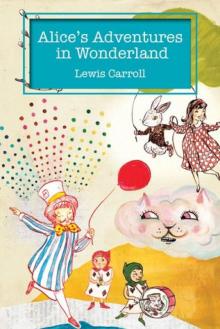 Alice's Adventures in Wonderland & Through the Looking-Glass
Alice's Adventures in Wonderland & Through the Looking-Glass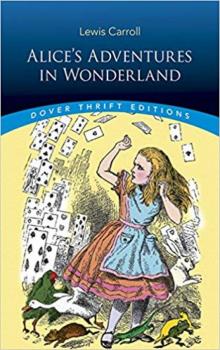 Alice's Adventures in Wonderland
Alice's Adventures in Wonderland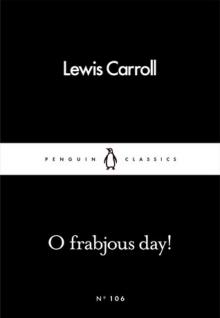 O Frabjous Day!
O Frabjous Day!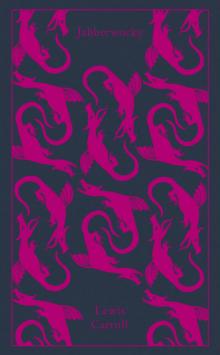 Jabberwocky and Other Nonsense
Jabberwocky and Other Nonsense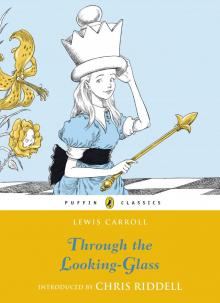 Through the Looking-Glass and What Alice Found There
Through the Looking-Glass and What Alice Found There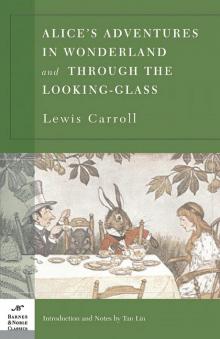 Alice's Adventures in Wonderland and Through the Looking Glass (B&N)
Alice's Adventures in Wonderland and Through the Looking Glass (B&N)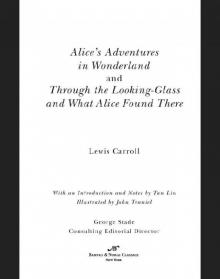 Alice's Adventures in Wonderland and Through the Looking Glass (Barnes & Noble Cla
Alice's Adventures in Wonderland and Through the Looking Glass (Barnes & Noble Cla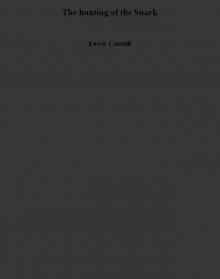 The hunting of the Snark
The hunting of the Snark The Complete Alice in Wonderland (Wonderland Imprints Master Editions)
The Complete Alice in Wonderland (Wonderland Imprints Master Editions)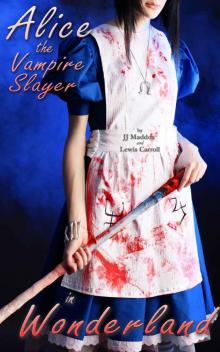 Alice in Wonderland: The Vampire Slayer
Alice in Wonderland: The Vampire Slayer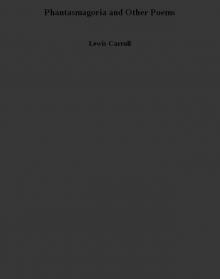 Phantasmagoria and Other Poems
Phantasmagoria and Other Poems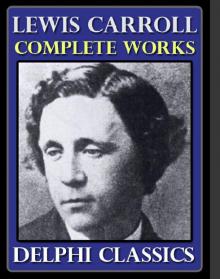 Complete Works of Lewis Carroll
Complete Works of Lewis Carroll Alice's Adventures in Wonderland illustrated
Alice's Adventures in Wonderland illustrated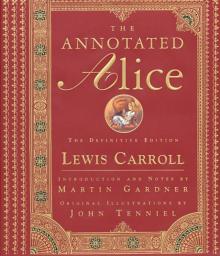 The Annotated Alice: The Definitive Edition (The Annotated Books)
The Annotated Alice: The Definitive Edition (The Annotated Books) Through the Looking Glass
Through the Looking Glass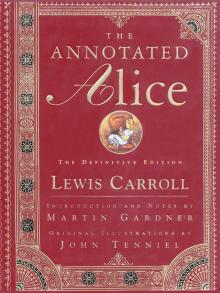 The Annotated Alice
The Annotated Alice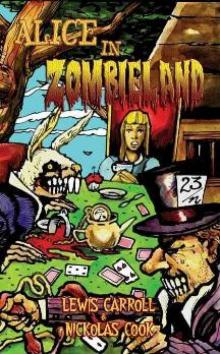 Alice in Zombieland
Alice in Zombieland